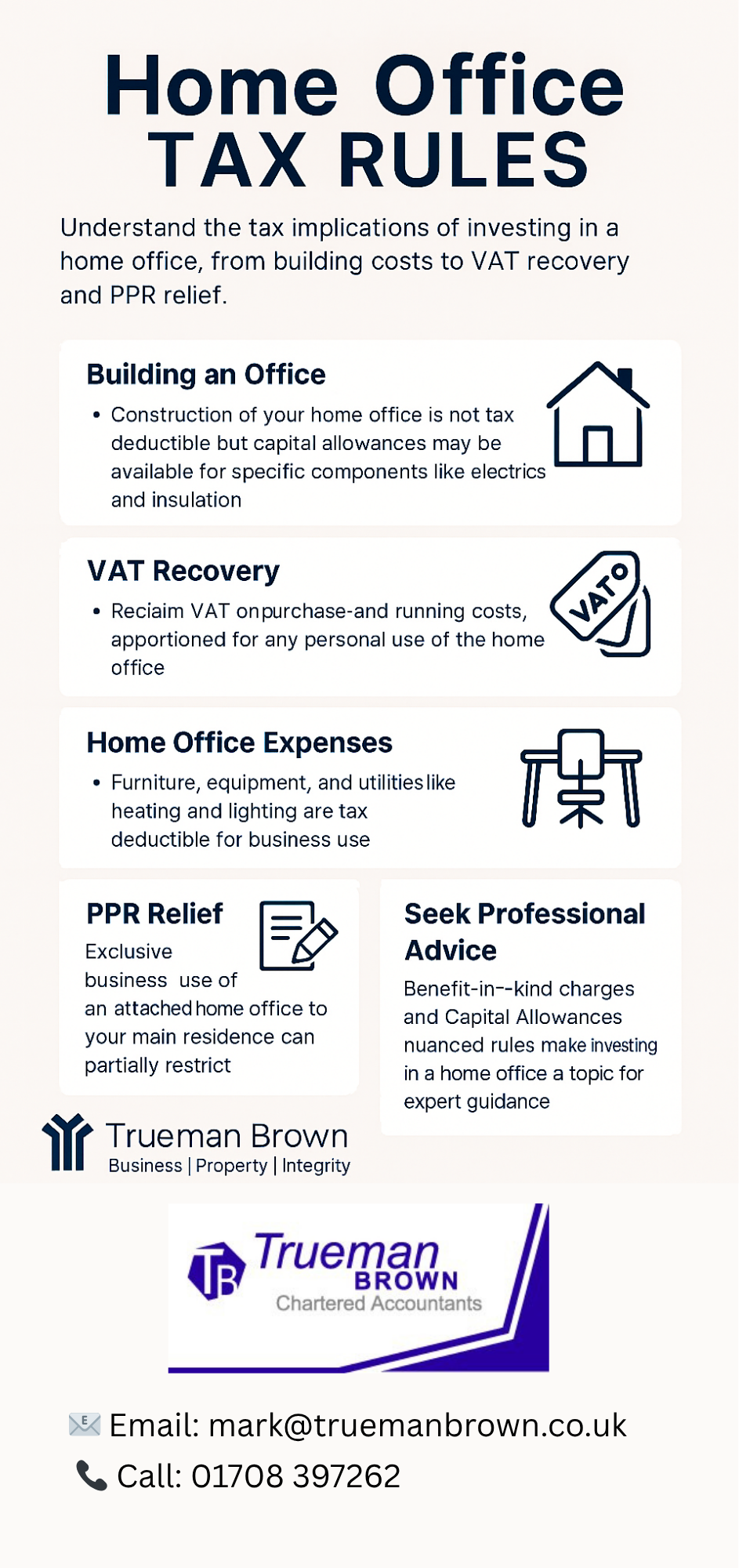Tax Implications of Building a Home Office in the UK
As flexible working becomes the norm, many professionals are investing in a home office to support remote work.
Whether you’re self-employed or a company director, understanding the tax treatment of such costs is essential.
From capital allowances to VAT recovery, HMRC rules can be complex—but with the right guidance, you can maximise relief and stay compliant.
What Qualifies as a Expense?
Setting up a home office often involves costs like:
- Building an extension or garden room
- Loft conversions
- Office furniture and equipment
- Heating, lighting, and water (if separately metered)
For the self-employed, the cost of the structure itself—whether built or purchased—is not tax deductible.
Initial decoration and delivery charges also fall outside allowable expenses.
However, ongoing repairs and redecoration are claimable.
Capital Allowances for Home Office Installations
Certain office components may qualify for capital allowances under HMRC’s plant and machinery rules.
These include:

- Thermal insulation
- Electrical systems
- Washbasins, sinks, and sanitaryware
- Furniture and furnishings (e.g. desks, curtains)
- Fire alarm systems
To claim, contractors must itemise invoices clearly. Note: capital allowances are only available under the accruals accounting method—not cash basis.
VAT Recovery on Home Office Costs
VAT rules differ from income and corporation tax. Businesses may reclaim VAT on:
- Running costs (e.g. heating, lighting)
- Building or purchasing a ready-made home office
- Decoration and furnishings
If the office is used partly for personal purposes, VAT must be apportioned on a just and reasonable basis.
Under the Flat Rate Scheme (FRS), VAT can be reclaimed on invoices over £2,000 if goods are itemised separately from labour. No split is required for invoices under £2,000.
Home Office and Principal Private Residence Relief
If your home office is attached to your main residence and used exclusively for business, you may lose part of your principal private residence (PPR) relief when selling the property.
HMRC considers exclusive business use grounds for denying PPR on that portion of the home.
Mixed-use rooms are safer from this restriction.
Business Asset Disposal Relief (BADR)
Directors who personally own a home office used by their company may qualify for BADR when disposing of shares.
To claim, the asset must have been used in the trade for at least two years prior to disposal.
This can include garden offices or converted rooms used exclusively for business.
How Trueman Brown Can Help with Your Home Office Setup
At Trueman Brown, we specialise in helping professionals and landlords navigate the tax implications of home office investments.
Whether you’re planning a build, converting a space, or claiming VAT, we’ll guide you through every step.
📧 Email: 📞 Call: 01708 397262
We’ll help you structure costs efficiently, claim allowable reliefs, and avoid common pitfalls—so your home office works for your business and your bottom line.
FAQs on Home Office Tax Relief
Q: Can I claim tax relief on building a garden office?
A: Not on the structure itself, but capital allowances may apply to specific components like electrics and insulation.
Q: Is VAT reclaimable on a home office used partly for personal use?
A: Yes, but you must apportion the VAT based on business use using a just and reasonable method.
Q: Will I lose PPR relief if my home office is used exclusively for business?
A: Potentially yes. Exclusive business use may trigger a restriction on PPR when selling your home.
Q: Can I claim capital allowances under the cash basis?
A: No. Capital allowances are only available under the accruals accounting method.
Q: What if my company pays for my home office build?
A: This may trigger a benefit-in-kind charge unless structured carefully. Professional advice is essential.

Recent Comments